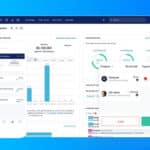
ERP systems are still relatively unfamiliar to some people, but ERP has become an inevitable trend in the application of small and medium-sized enterprises. Adaptive has compiled some necessary knowledge for familiarity with ERP. Using ERP systems requires a variety of knowledge, including the following: Aspects:
ERP system knowledge: This is the most basic knowledge, including the basic concepts, principles, functional modules, etc. of the ERP system. You need to understand the overall architecture of the ERP system, the functions of each module, and the relationships between them.
Business process knowledge: It is a tool for managing an enterprise’s business processes and requires an in-depth understanding of the enterprise’s business processes. This helps you better configure and use the ERP system to better meet your company’s business needs.
Computer technical knowledge: The ERP system is a computer system and requires certain computer technical knowledge, including operating systems, databases, networks, etc. This knowledge will help you better maintain, operate and manage ERP systems.
Data analysis knowledge: The ERP system has accumulated a large amount of corporate data and has certain data analysis knowledge, including data mining, data package table production, etc. This will help you obtain valuable information from the data to support business decision-making.
Project management knowledge: Implementing an ERP system is usually a project, and you need to have certain project management knowledge, including project planning, project implementation, project monitoring, etc. This will help you better coordinate and manage project resources and ensure the smooth implementation of the project.
Communication and coordination skills: The use of ERP systems usually involves multiple departments and multiple stakeholders. Good communication and coordination skills can effectively coordinate the interests and needs of all parties.
Continuous knowledge learning: ERP systems are an evolving field, and new technologies and methods are constantly emerging. Have the awareness of continuous learning, constantly update and expand your knowledge reserves, and learn to keep pace with the times.
Using ERP systems requires a wide range of knowledge, including ERP system knowledge, business process knowledge, computer technology knowledge, data analysis knowledge, project management knowledge, communication and coordination skills, and awareness of continuous learning.
Generally speaking, it seems that these may involve some people’s knowledge blind spots or shortcomings, but as an operator, you may already have these abilities, but you don’t have such cognition literally, so you don’t need to think about these. Too difficult to understand.
If you need further information before use, you can consult Adaptive’s customer service staff at any time to get more information.




